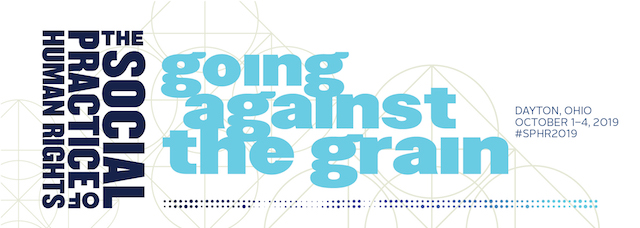Paper/Proposal Title
Innovative Collaboration to Further Community Self-Determination
Location
Innovations in Economic and Social Rights
Start Date
10-3-2019 9:00 AM
End Date
10-3-2019 10:30 AM
Keywords
cooperative, food
Abstract
The built urban environment is the product of more than a century of policy decisions that have both intentionally discriminated and have had the effect of discriminating, against African Americas, immigrants, the work class, low income individuals and other undesirables. While more than fifty years have passed since the passage of civil rights legislation in the United States, individuals in today’s cities are living out our discriminatory legacy.
In Dayton, Ohio, a new movement has risen from the community to disrupt the legacy of de jure and de facto discrimination by the collaborative efforts of the impactive individuals, neighborhood leaders, organizers, and lawyers to re-imagine how development occurs and who benefits. Through mutual support within the community, Dayton is a living example of building a sustained movement that places community wealth building, self-determination, collective hope and praxis at the center of its efforts. An example is the origins of the Gem City Market, specifically how the community utilized Public Health Montgomery County & Dayton Opportunity Maps as the basis for a larger discussion about needs and aspirations community, and how lawyers, working with the community, were able to translate the vision of a full service grocery store to address food inequality into the policy and structure of the market.
Author/Speaker Biographical Statement(s)
Amaha Sellassie is a peace builder, social healer, freedom fighter and lover of humanity. He's an instructor in Sociology and director of Center for Applied Social Issues at Sinclair Community College in Dayton Ohio. Amaha is also the President of the Gem City Market Board of Director’s, community driven effort to address food apartheid in a Dayton neighborhood through a community and worker worked owned full service grocery store. A Pan Africanist practitioner scholar dedicated towards building bridges of trust, healing historical wounds, and harnessing the unique gifts and talents of every human being as we press towards a just and equitable society. Amaha is a Caux Scholar fellow trained in the Swiss Alps in peacebuilding and healing historical wounds. He is a past chair of the city of Dayton Human Relations Council, a member of the Community Police council (CPC) and the co-chair of the MLK March. Currently he is working towards his Ph. D. in Sociology at the University of Cincinnati with an emphasis on utilizing community based participatory research (CBPR) towards emerging equity and community transformation.
Matthew Currie is a Managing Attorney with Advocates for Basic Legal Equality, a non- profit regional law firm that provides high quality legal assistance in civil matters to help eligible lowincome individuals and groups in western Ohio achieve self-reliance, and equal justice and economic opportunity. Matthew oversees the firm’s Housing and Community Economic Development practice. He has been an attorney with ABLE since 2005. During this time, Matthew has successfully represented tenants in numerous housing matters, including fair housing, equal access, and due process litigation. More recently, Matthew has provided vital support to community groups and neighborhood activists interested in resiliency and equity. This work includes efforts to open the Gem City Market, a multi-stakeholder cooperative grocery store in a Dayton food desert. He is a founding member and current President of the Greater Dayton Union Cooperative Initiative, a worker-owner business incubator inspired by the principles and structure of Mondragon to create an economy that works for everyone. Matthew is an Adjunct Professor at the University of Dayton School of Law, where he developed and teaches the Social Justice Law Capstone course. Matthew graduated from Vermont Law School with a J.D. and a Master of Studies in Environmental Law.
Included in
Business Organizations Law Commons, Civic and Community Engagement Commons, Civil Rights and Discrimination Commons, Community-Based Learning Commons, Community-Based Research Commons, Food Security Commons, Food Studies Commons, Growth and Development Commons, Human Rights Law Commons, Law and Race Commons, Law and Society Commons, Place and Environment Commons, Politics and Social Change Commons
Innovative Collaboration to Further Community Self-Determination
Innovations in Economic and Social Rights
The built urban environment is the product of more than a century of policy decisions that have both intentionally discriminated and have had the effect of discriminating, against African Americas, immigrants, the work class, low income individuals and other undesirables. While more than fifty years have passed since the passage of civil rights legislation in the United States, individuals in today’s cities are living out our discriminatory legacy.
In Dayton, Ohio, a new movement has risen from the community to disrupt the legacy of de jure and de facto discrimination by the collaborative efforts of the impactive individuals, neighborhood leaders, organizers, and lawyers to re-imagine how development occurs and who benefits. Through mutual support within the community, Dayton is a living example of building a sustained movement that places community wealth building, self-determination, collective hope and praxis at the center of its efforts. An example is the origins of the Gem City Market, specifically how the community utilized Public Health Montgomery County & Dayton Opportunity Maps as the basis for a larger discussion about needs and aspirations community, and how lawyers, working with the community, were able to translate the vision of a full service grocery store to address food inequality into the policy and structure of the market.



